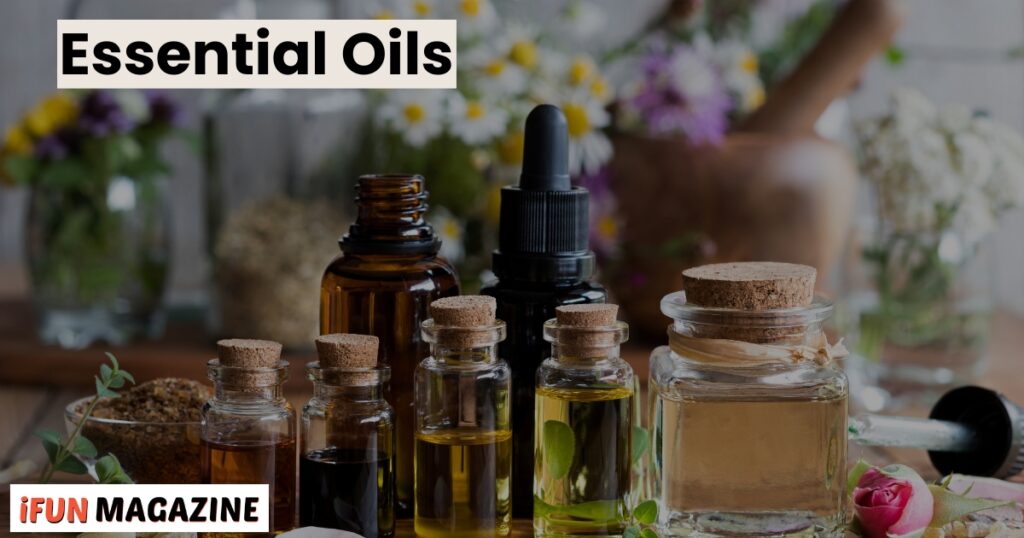The use of essential oils for therapeutic purposes is known as aromatherapy. Many societies have been practising it for thousands of years. Various plant and flower parts are used to generate essential oils. Aromatherapy is widely used for healing and relaxation. It was often employed in rituals and as natural medicine.
Sleep is essential for protecting both mental and physical well-being. Lack of sleep may cause several health issues. Insomnia and other sleeping disorders are prevalent around the world and have negative impacts on health. People with sleep problems frequently fail to go about their daily lives properly.
A natural way to boost the quality of your sleep is through aromatherapy. Solving such issues may be made more accessible by understanding how aromatherapy helps sleep. In this blog, we will learn about “How Can Aromatherapy Help with Sleep?”.
What is Aromatherapy, and how does it work?
Essential oils for mental and physical wellness are known as Aromatherapy. Essential oils are beneficial and derived from plants to gather their fragrances. You can diffuse these oils into the air, apply them to your skin, or inhale them. The brain’s limbic system can be activated by inhalation, which may impact memory and emotions.
This procedure may encourage mood enhancement, relaxation, and stress reduction. Oils can be absorbed into the skin through topical application, delivering advantages that are specific to the area. The benefits of different essential oils range; lavender, for instance, aids relaxation.
Aromatherapy enhances standard medical therapies and is considered a complementary therapy. Its application is usually safe with proper guidance but should be used cautiously. Overall, Aromatherapy offers a natural way to support physical and emotional health.
Mechanism of Aromatherapy
Scent is the primary way that Aromatherapy affects the brain. In this process, the olfactory system is crucial. Scents engage receptors in the nose, which transmit information to the brain when breathed.
The limbic system, which controls emotions and memory, takes these messages. Stress levels and mood can be affected by the limbic system’s reaction. Hormones may be produced as a result of essential oils. Dopamine and serotonin are two hormones that encourage happiness and relaxation. Aromatherapy also influences cortisol and melatonin levels.
Increased melatonin supports better sleep, while reduced cortisol lowers stress. This hormonal balance contributes to improved sleep quality and relaxation. Understanding Aromatherapy’s mechanisms enhances its effectiveness for better health.
Essential Oils for Sleep

Several oils can aid in improving sleep quality. These include:
Lavender Oil
It is well known that lavender oil has sleeping effects. It facilitates better sleep and less worry. Its relaxing aroma inspires relaxation and a sense of calm. Studies show lavender oil can improve sleep quality over time. Research supports its use for reducing heart rate and promoting tranquillity. Many people experience deeper sleep with lavender oil. It’s safe for most users when appropriately used.
Chamomile Oil
Chamomile oil’s ability to help with relaxation is famous. It properly promotes mood and relieves the mind. The oil can help ease anxiety and tension. A standard solution for sleeplessness is chamomile. There is evidence that chamomile can improve the duration of sleep. It is traditionally used worldwide for tranquillity. Studies indicate it may decrease sleep disruptions. Safe under guidance, it comforts and relaxes naturally.
Bergamot Oil
Bergamot oil has mood-boosting properties that improve mood and reduce anxiety levels. Its bright scent creates an energizing and peaceful atmosphere. Bergamot oil absorption can ease anxiety and encourage relaxation. Regular consumption may help moderate erratic emotions. The distinctive aroma of bergamot oil provides a relaxing atmosphere. Its relaxing qualities make it a popular choice in Aromatherapy.
Valerian Oil
The well-known relaxing effects of Valerian assist individuals in sleeping better. This essential oil helps promote peace and alleviate restlessness. Valerian supports a conducive environment for deep relaxation. It is commonly utilized to treat cases of insomnia. Valerian is used in Aromatherapy to assist in relaxing the nervous system. Regular usage may lower sleep latency and boost overall sleep quality.
Ylang Ylang Oil
Ylang Ylang oil is known for its peaceful, floral scent. It can reduce anxiety and stress levels. The oil helps improve mood and brings inner calm. Ylang-Ylang is used to create a soothing sleep environment. It supports relaxation by slowing down emotions. Many prefer it for its gentle, calming effects. Over time, it enhances sleep quality naturally.
Cedarwood Oil
Cedarwood oil has a warm, woody aroma that calms the mind. It is widely used for sleep promotion. Its scent encourages a sense of safety and relaxation. Cedarwood helps in reducing anxiety and stress. It is often used to improve focus and mood. The oil supports a restful night by balancing emotions. Cedarwood is valued for creating a peaceful space.
Explore More: 10 Positive Affirmations to Boost Confidence
Methods of Aromatherapy Application
Diffusers
Essential oils are carried into the atmosphere for inhalation by diffusers. There are lots of varieties, such as nebulizing and supersonic diffusers. Ultrasonic diffusers use water and vibration to release mist. Nebulizing diffusers don’t use water and offer a more aromatic scent. For best results, clean diffusers regularly and follow instructions.
Add a few drops of essential oil for desired effects. Avoid using oils around children or pets. Use in well-ventilated areas to ensure air circulation. Diffusing during bedtime can promote relaxation and sleep. Experiment with different oils to find your favorite blend.
Topical Application
Applying essential oils physically to the skin is known as a topical application. Always use carrier oils, such as jojoba or coconut, to reduce the concentration of essential oils. One drop of essential oil for every teaspoon of carrier oil is often a safe dilution ratio. Test diluted oils on a small skin area for reactions.
Apply to pulse points like wrists and temples for impact. Use gentle, circular motions when applying the oils. Essential oils can relieve localized stress and soothe muscles. Avoid sensitive areas like eyes and broken skin. Consult a professional for advice on skin concerns. Frequent use enhances benefits, but don’t overapply.
Baths and Showers
Essential oils can be added to baths for relaxation. Mix a few drops with Epsom salts or milk before adding. This ensures even distribution of oils in the bathwater. Popular relaxing recipes include lavender, chamomile, and ylang-ylang combinations. Run a warm bath and add the oil mixture to it. Soak for 20 minutes to enjoy the calming effects.
In the shower, place oils on a washcloth and inhale gently. Aromatic steam enhances the relaxing shower experience. Always be cautious with oils in slippery bath conditions. Essential oils can offer gentle stress relief through bathing routines. Adjust recipes to suit personal preferences and needs.
Safety and Precautions

Potential Side Effects and Allergic Reactions
Essential oils can cause skin irritation or allergic reactions. Conduct a patch test before use. Avoid direct exposure to sunlight after the application of citrus oils. Inhaling too much oil may cause headaches or dizziness in some users. Monitor for any unusual symptoms after using new essential oils. Seek medical help if you experience severe side effects.
Importance of Using High-Quality, Pure Essential Oils
High-quality, pure essential oils ensure the best therapeutic benefits. Low-quality oils may contain harmful additives or chemicals. Check labels for the botanical name to ensure purity. Choose reputable brands recognized for their quality control standards. Store oils in cool, dark, dry places to preserve potency. Fresh oils maximize benefits and reduce contamination risks.
Guidelines for Use in Children, Pregnant Women, and Individuals With Sensitive Conditions
Consult a healthcare professional before using essential oils on children or pregnant women. Use only child-safe oils with proper dilution for kids. Pregnant women should avoid oils that might affect hormones or induce contractions. Individuals with asthma or epilepsy should use caution with essential oil inhalation. Always dilute oils for sensitive skin to prevent irritation. Ensure that you follow expert guidelines for safer application.
Case Studies and Research
Research shows aromatherapy improves sleep quality and reduces symptoms of insomnia. A study found lavender oil enhances relaxation and aids sleep. Valerian and chamomile oils promote more profound, more restful sleep. Studies indicate essential oils reduce sleep disturbances in adults and children. Experts agree Aromatherapy supports healthy sleep patterns and reduces anxiety before sleeping. Further research validates these positive outcomes widely.
Many people report improved sleep using essential oils like lavender and cedarwood. Users say these oils help them fall asleep faster and sleep longer. Experts recommend Aromatherapy as a natural approach to better sleep. Aromatherapists suggest personalized blends for optimized benefits and relaxation. Client testimonials often highlight reduced nighttime awakenings and improved mood upon waking. Expert advice emphasizes the safe and consistent use of oils.
FAQs
How does Aromatherapy work in the brain?
The brain’s limbic system takes messages from activated smell receptors, which is how Aromatherapy works. The limbic system influences relaxation by handling emotions, reactions to stress, and memory functions.
Where do you put essential oils to help you sleep?
Essential oils can be utilized on pulse fields such as the neck, wrists, or temples. You can use spread oils in your bedroom for peaceful, calming air.
How do you use aromatherapy sleep spray?
Before bed, lightly cover your pillow with aromatherapy sleep spray. This ensures that the soothing aroma will help you unwind and sleep earlier. Shake the bottle thoroughly to ensure that the oils are spread out evenly. Change the quantity of sprays depending on how strong you like the scent.
What are the effects of Aromatherapy?
Aromatherapy calms the mind, boosts mood, reduces anxiety, and improves sleep quality.
How To Choose High-Quality Essential Oils for Sleep
Look for oils with pure botanical names on the packaging to ensure authenticity and quality. Choose reputable brands with good reviews that follow strict quality control processes. Always opt for oils in dark glass bottles to prevent light from degrading their potency. Consider certified organic oils for a chemical-free and natural sleeping aid experience.
Conclusion
Aromatherapy can naturally improve sleep by using essential oils effectively. There are several advantages to using oils like lavender and cedarwood to help people relax. Boosting sleep patterns and quality can be performed gently and effectively with Aromatherapy. Using diffusers regularly facilitates the dispersion of oils for more effortless inhalation before bed. Topical applications and baths provide versatile methods for personalizing aromatherapy experiences.
Safety measures and proper dilution keep the process enjoyable and beneficial. Selecting quality oils delivers the best possible therapeutic results and prevents unwanted side effects. Speaking with an expert promotes the safe application of Aromatherapy. Exploring this natural remedy can transform sleep routines for many enthusiasts. Integrating Aromatherapy into nightly routines promotes a peaceful, restful environment.




